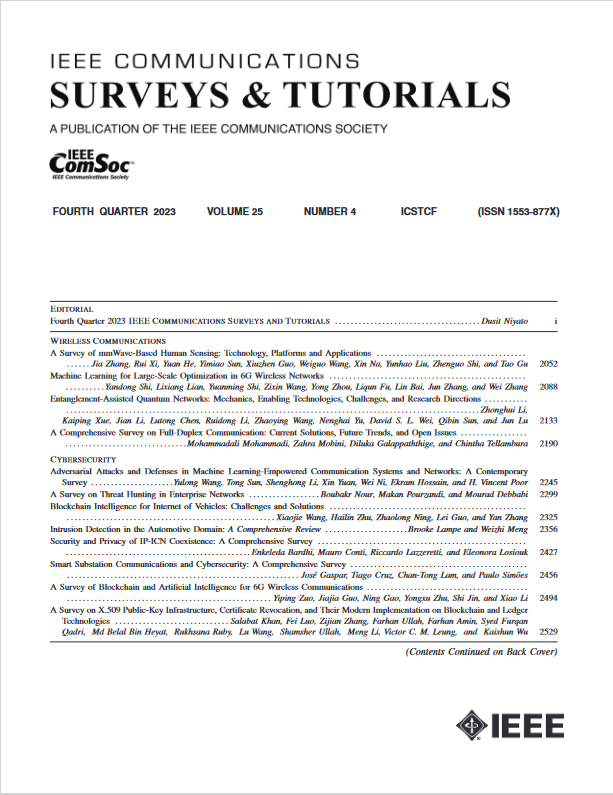Tensor-Empowered Federated Learning for Cyber-Physical-Social Computing and Communication Systems
IF 34.4
1区 计算机科学
Q1 COMPUTER SCIENCE, INFORMATION SYSTEMS
引用次数: 1
Abstract
The deep fusion of human-centered Cyber-Physical-Social Systems (CPSSs) has attracted widespread attention worldwide and big data as the blood of CPSSs could lay a solid data cornerstone for providing more proactive and accurate wisdom services. However, due to concerns about data privacy and security, traditional data centralized learning paradigm is no longer suitable. Federated Learning (FL) as an emerging distributed privacy-preserving machine learning paradigm would have great research significance and application values. Although few survey papers on FL already exist in the literature, the survey about FL from the perspective of human-centered CPSSs and tensor theory is lacking. Toward this end, we first introduce the CPSSs and deeply analyze the correlations among humans, cyber space, physical space and social space, as well as the opportunities brought by it. Afterwards, we present an overview of FL and then review extensive researches on FL in terms of resources management, communication, security and privacy protection, which provides a shortcut for readers to quickly understand and learn FL. Furthermore, the theory about tensor representation, operation and decomposition for handling massive, multi-source heterogeneous big data and corresponding applications are described. By leveraging the advantages of tensor in unified modeling, dimensionality reduction, and feature extraction, a framework and three tensor-empowered solutions are provided to solve these challenges about heterogeneous resource management, communication overhead together with security and privacy. Finally, some future research directions are listed for looking forward to inspiring more readers to devote themselves to researching tensor-empowered FL for human-centered CPSSs in the future.面向网络-物理-社会计算和通信系统的张量授权联邦学习
以人为中心的网络物理社会系统(CPSS)的深度融合引起了全世界的广泛关注,大数据作为CPSS的血液可以为提供更主动、更准确的智慧服务奠定坚实的数据基石。然而,由于对数据隐私和安全的担忧,传统的数据集中学习模式已不再适用。联合学习作为一种新兴的分布式隐私保护机器学习范式,具有重要的研究意义和应用价值。尽管文献中很少有关于外语的调查论文,但缺乏从以人为本的CPSS和张量理论的角度对外语进行调查。为此,我们首先介绍了CPSS,并深入分析了人类、网络空间、物理空间和社会空间之间的相关性及其带来的机遇。然后,我们对FL进行了概述,然后回顾了在资源管理、通信、安全和隐私保护等方面对FL的广泛研究,为读者快速理解和学习FL提供了一条捷径。此外,介绍了处理海量多源异构大数据的张量表示、运算和分解理论及其应用。通过利用张量在统一建模、降维和特征提取方面的优势,提供了一个框架和三个张量授权的解决方案来解决异构资源管理、通信开销以及安全和隐私方面的挑战。最后,列出了一些未来的研究方向,以期激励更多的读者在未来致力于研究以人为中心的CPSS的张量授权FL。
本文章由计算机程序翻译,如有差异,请以英文原文为准。
求助全文
约1分钟内获得全文
求助全文
来源期刊

IEEE Communications Surveys and Tutorials
COMPUTER SCIENCE, INFORMATION SYSTEMS-TELECOMMUNICATIONS
CiteScore
80.20
自引率
2.50%
发文量
84
审稿时长
6 months
期刊介绍:
IEEE Communications Surveys & Tutorials is an online journal published by the IEEE Communications Society for tutorials and surveys covering all aspects of the communications field. Telecommunications technology is progressing at a rapid pace, and the IEEE Communications Society is committed to providing researchers and other professionals the information and tools to stay abreast. IEEE Communications Surveys and Tutorials focuses on integrating and adding understanding to the existing literature on communications, putting results in context. Whether searching for in-depth information about a familiar area or an introduction into a new area, IEEE Communications Surveys & Tutorials aims to be the premier source of peer-reviewed, comprehensive tutorials and surveys, and pointers to further sources. IEEE Communications Surveys & Tutorials publishes only articles exclusively written for IEEE Communications Surveys & Tutorials and go through a rigorous review process before their publication in the quarterly issues.
A tutorial article in the IEEE Communications Surveys & Tutorials should be designed to help the reader to become familiar with and learn something specific about a chosen topic. In contrast, the term survey, as applied here, is defined to mean a survey of the literature. A survey article in IEEE Communications Surveys & Tutorials should provide a comprehensive review of developments in a selected area, covering its development from its inception to its current state and beyond, and illustrating its development through liberal citations from the literature. Both tutorials and surveys should be tutorial in nature and should be written in a style comprehensible to readers outside the specialty of the article.
 求助内容:
求助内容: 应助结果提醒方式:
应助结果提醒方式:


